I was invited to present at Imperial’s PPI network this week to talk on the theme of inclusivity in PPI (public and patient involvement in research). In the PIER partnership and the newly formed Research Centre for Seldom Heard Voices, we are exploring challenges and opportunities for engaging seldom heard voices in PPI. The basis of our work is that those most affected by health inequalities often have the least opportunity to inform and shape health research. Beresford (2007:310) highlights that if diversity and the barriers that can be in the way of increasing diversity are not addressed, ‘participation is likely to be partial, and reflect broader social divisions and exclusions’ i.e. it will further reinforce health inequalities. This led to some great discussions within the PPI network. The main focus was whether we need to approach PPI differently to engage a more diverse range of voices. From our work at BU, we are finding that we need to think differently about who we involve and how we involve. Only a certain demographic of people will feel comfortable and confident engaging in focus groups, providing feedback on plain English summaries or voicing their opinions in formal settings. These methods and voices are valid but in our experience, are not particularly diverse. Our current work seeks to engage marginalised groups such as rough sleepers in PPI activities by creating outreach opportunities for researchers to ‘go to them’. As a starting point, we challenge the notion of ‘hard to reach’ groups. In our experience, marginalised groups are easier to locate and engage when collaborating with community organisations such as night shelters. The challenge is to change a culture of PPI which relies on the public ‘entering our world’ rather than us seeking a wider range of voices out in the community. It would be good to hear your thoughts and examples. Dr Mel Hughes, mhughes@bournemouth.ac.uk
Category / Psychology
Emotional Processing Therapy for Post Traumatic Stress Disorder Workshop – 26 October 2018

Our very own Professor Roger Baker is facilitating a one day workshop on Emotional Processing Therapy for PTSD in Leeds on 26th October 2018.
The workshop will explore what an emotional processing style is and how this is relevant to the development and presentation of PTSD, there will be a range of teaching, skills training, role play, discussion and exploring case studies.
Please see flyer here for more information or book online here.
Don’t forget, BUCRU can provide FREE methodological advice and support in designing your research project. We’re based on the 5th floor of Royal London House so feel free to pop in and see us, call us on 61939 or send us an email.
NIHR Research Design Service – new contract

We were pleased to announce earlier in the year that the National Institute for Health Research (NIHR) has awarded us a further five years of funding to continue our work as the RDS South West. Today marks the beginning of our third five-year contract.
This NIHR funding allows RDS advisers in the South West to continue offering free and confidential advice, drawing on a unique breadth of experience and established track record in improving funding applications.
Please see our latest BUCRU/CoPMRE newsletter or find out more about how we could help you by visiting RDS SW website or contacting the RDS South West Bournemouth Office hosted within BUCRU (Bournemouth University Clinical Research Unit):
Bournemouth University
Room R505, Royal London House
Christchurch Road
Bournemouth
Dorset, BH1 3LT
Tel: 01202 961939
Email: wardl@bournemouth.ac.uk
New CMMPH publication on sex trafficking
Earlier this month the Journal of Manmohan Memorial Institute of Health Sciences published a paper co-authored by Centre for Midwifery, Maternal & Perinatal Health (CMMPH) staff. The paper ‘Health consequences of sex trafficking: A systematic review’ [1]. The Journal of Manmohan Memorial Institute of Health Sciences is part of the Open Access publishing of Nepal Journals OnLine (NepJOL) supported by INASP.
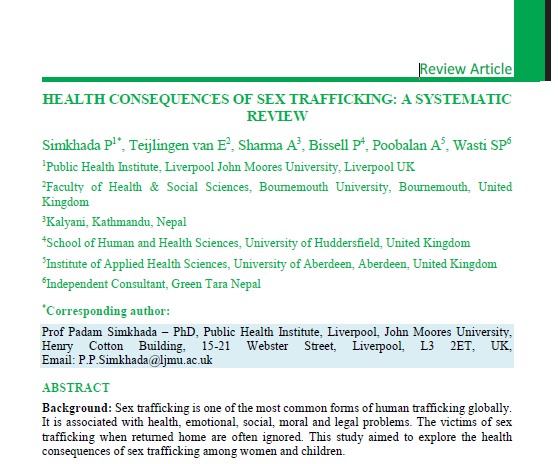 The review reminds us that sex trafficking is one of the most common forms of human trafficking globally. It is associated with health, emotional, social, moral and legal problems. The victims of sex trafficking when returned home are often ignored. This review explored the health consequences of sex trafficking among women and children. A total of 15 articles were included covering health risks and well-being related to sex trafficking. Sexual and physical violence among victims such as rape and repetitive stress and physical injuries were common. The prevalence of STI (sexually transmitted infections) and HIV (human immunodeficiency virus) was also reported as high. Being trafficked at a young age, having been in brothels for a longer period and sexual violence and forced prostitution were linked with a higher risk for HIV infection. Physical health problems reported included headaches, fatigue, dizziness, back pain, memory problem, stomach pain, pelvic pain, gynaecological infections, weight loss, lesions or warts, unwanted pregnancies and abortions. The studies on mental health reported that depression, anxiety and post-traumatic stress disorder (PTSD) were commonly reported health consequences among sex trafficking victims.
The review reminds us that sex trafficking is one of the most common forms of human trafficking globally. It is associated with health, emotional, social, moral and legal problems. The victims of sex trafficking when returned home are often ignored. This review explored the health consequences of sex trafficking among women and children. A total of 15 articles were included covering health risks and well-being related to sex trafficking. Sexual and physical violence among victims such as rape and repetitive stress and physical injuries were common. The prevalence of STI (sexually transmitted infections) and HIV (human immunodeficiency virus) was also reported as high. Being trafficked at a young age, having been in brothels for a longer period and sexual violence and forced prostitution were linked with a higher risk for HIV infection. Physical health problems reported included headaches, fatigue, dizziness, back pain, memory problem, stomach pain, pelvic pain, gynaecological infections, weight loss, lesions or warts, unwanted pregnancies and abortions. The studies on mental health reported that depression, anxiety and post-traumatic stress disorder (PTSD) were commonly reported health consequences among sex trafficking victims.
The authors of the review concluded that there is a compelling need for interventions raising awareness about sex trafficking among young girls and women most at risk of being trafficked. Most studies in this review have focussed on the physical health problems of the trafficked victims although there is also remarkable mental burden amongst those victims. Key policy makers, government officials, public health officials, health care providers, legal authorities and non-governmental organisations (NGOs) should be made aware about the health risks and consequences of trafficking. Trafficking consequences should be recognised as a health issue and all the sectors involved including regulating bodies should collaborate to fight against sex trafficking
Related research in this field at Bournemouth University include the Sexual Spaces Project by Prof. Mike Silk and Dr. Amanda De Lisio on ‘Rio’s sex workers after the Olympics’ and the The Gay and Grey Project, funded through a Big Lottery Grant and led by Prof. Lee Ann Fenge.
Prof. Edwin van Teijlingen
Centre for Midwifery, Maternal & Perinatal Health (CMMPH)
Reference:
- Simkhada, P., van Teijlingen, E., Sharma, A., Bissell, P., Poobalan, A., Wasti S.P. (2018) Health consequences of sex trafficking: A systematic review Journal of Manmohan Memorial Institute of Health Sciences, 4(1): 130-149.
Publishing systematic and scoping reviews to improve your research profile
With the forthcoming REF 2021 in mind we would like to encourage both staff and postgraduate students to consider writing up their literature reviews as journal articles. Systematic and scoping reviews are a great way of publishing quality publications. They are highly valued as REF submissions, especially, but not only, in the health field.
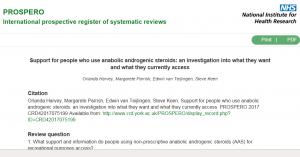
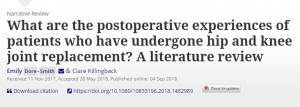 There is plenty of support at Bournemouth University: from academic colleagues, with vast experience in writing reviews, to the library team, who can advise on, for example, developing your systematic search strategy and which databases to search.
There is plenty of support at Bournemouth University: from academic colleagues, with vast experience in writing reviews, to the library team, who can advise on, for example, developing your systematic search strategy and which databases to search.
You can start with publishing your review question and research strategy on PROSPERO, international prospective register of systematic reviews. We would like to highlight just one BU example in the field of the social sciences. FHSS PhD student Orlanda Harvey published her proposed review ‘Support for people who use anabolic androgenic steroids: an investigation into what they want and what they currently access’ late last year on PROSPERO [1].
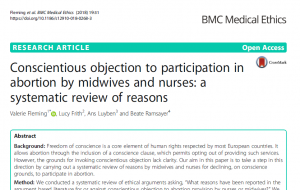
You might like to have a look at reviews published by Bournemouth University staff, which can be found by searching BURO, our institutional repository of research outputs. Moreover, BU academics have published several methods papers on the doing and writing systematic reviews [2-4].
Information about searching the literature for systematic reviews is available on this guide by the library team.
Other pages with useful information include:
- Guidance from the Centre for Review and Dissemination
- The Cochrane handbook for systematic reviews
- The PRISMA statement: Preferred Reporting Items for Systematic Reviews & Meta-Analyses
- The PRISMA extension for scoping reviews
Hopefully we have encouraged you to think about publishing your literature reviews as separate articles, and to seek help early in that process!
José López Blanco & Edwin van Teijlingen
For further information, please contact:
José López Blanco, Faculty Librarian (Health and Social Sciences), Library & Learning Support, Academic Services at tel 67350 or email: hsslibteam@bournemouth.ac.uk
References:
- Harvey, O., Parrish, M., van Teijlingen, E., Keen., S. (2017) Support for people who use anabolic androgenic steroids: an investigation into what they want and what they currently access. PROSPERO 2017 CRD42017075199 Available from: http://www.crd.york.ac.uk/PROSPERO/display_record.php?ID=CRD42017075199
- van Teijlingen E., Napper, M., Bruce, J., Ireland. J. (2006) Systematic reviews in midwifery, RCM Midwives Journal 9(5): 186-188.
- van Teijlingen, ER, Simkhada, B., Ireland J., Simkhada P., Bruce J. (2012) Evidence-based health care in Nepal: The importance of systematic reviews, Nepal Journal of Epidemiology 1(4): 114-118.
- Stewart, F., Fraser, C., Robertson, C., Avenell, A., Archibald, D., Douglas, F., Hoddinott, P., van Teijlingen, E., Boyers, D. (2014) Are men difficult to find? Identifying male-specific studies in MEDLINE and Embase, Systematics Reviews 3,78.
Young at Art
Over the past year, Dr Ben Hicks and Dr Shanti Shanker have been running a range of public outreach seminars, funded by the British Psychological Society, to explore identity and raise awareness of issues related to the brain and neuropsychology. Part of this work included a series of graffiti workshops for people living with dementia both in the community as well as an Assisted Living Facility in Brighton. These workshops sought to use this art form as a means to engage people with dementia and explore their sense of ‘self,’ whilst also providing them with an opportunity to participate in new, meaningful activities and continue their life-long learning.
As part of the project this work was filmed and the final piece is now available for public dissemination. If you are interested in the work, please take a look at the video below, which details the 2-day graffiti workshop at the Assisted Living Facility, Brooke Mead in Brighton. The graffiti workshops were delivered by Angela El-Zeind from GraffInc. and the video was produced by James Skinner from Skinner Productions.
For further details on the project, please contact Ben Hicks on: bhicks@bournemouth.ac.uk
Erasmus + Programme: Visit to the Sanchez-Vives Lab at the Institute for Biomedical Research IDIBAPS-Barcelona
What is consciousness? In the traditional view, consciousness is a state of self-awareness in which the brain can experience perceptions; but which suddenly disappears in anaesthesia, coma or dreamless sleep. However, the common belief that there is sharp edge between an underlying unconscious state and consciousness is being challenged by new neurophysiological findings and theoretical models.
Is an isolated network of cells, a piece of mammal brain confined in a dish (an in vitro preparation) “conscious of itself”? if so, how can this be demonstrated? And by extension, is it a complex neuronal network model, capable of emulating the causal computations of such neuronal circuit, able to perform conscious functions?
These and connected topics were the focus of the discussions during my fascinating visit last June to the Sanchez-Vives Lab http://www.sanchez-vives.org/, within the Institute for Biomedical Research IDIBAPS; located in the core of the city of Barcelona, in the picturesque carrer Rosello. The visit was supported the Erasmus + Funds for Staff Mobility, https://www.erasmusplus.org.uk/apply-for-higher-education-student-and-staff-mobility-funding; through Global BU at Bournemouth University, coordinated by Ms Elaine Asbridge.
 Professor Maria-Victora Sanchez-Vives is the leader of an associated project within the large Human Brain Project initiative, https://www.humanbrainproject.eu/en/ a FLAGSHIP FET 2020 project, spanning for 10 years and involving the over 100 European Universities. Mavi Sanchez-Vives co-supervises a Bournemouth University PhD student, Mr Roman Arango-Cabrera, whose research focuses on studying the rhythms of the spontaneous neuronal activity in isolated cortical slices in vitro.
Professor Maria-Victora Sanchez-Vives is the leader of an associated project within the large Human Brain Project initiative, https://www.humanbrainproject.eu/en/ a FLAGSHIP FET 2020 project, spanning for 10 years and involving the over 100 European Universities. Mavi Sanchez-Vives co-supervises a Bournemouth University PhD student, Mr Roman Arango-Cabrera, whose research focuses on studying the rhythms of the spontaneous neuronal activity in isolated cortical slices in vitro.
I was particularly keen to know directly from the team of experienced postdoctoral researchers the experimental process leading to the datasets that Roman has been analysing. Likewise, I was very excited about explaining Mavi and the team the new ideas that we are designing in Bournemouth.

Their recording techniques are especially devised for identifying the spatiotemporal propagation of extracellular potentials through a neuronal network. During my short period in Barcelona, we discussed the design of a new experiment, a variant of their current state-of-the-art recording system by enhancing the precision of the registrations. This new experiment can serve as a feasibility test for our new algorithms developed in Bournemouth University.
The visit was successful in every way, I learned a lot and enjoyed very much the atmosphere in the lab during the four days I spent with them. I am very grateful to Mavi, Vanessa and to every member of the Lab for the invitation and for the great support.
In summary, in the quest for a biophysical substrate of consciousness, a key milestone is the understanding of spontaneous activity propagation in isolated cortical networks; which is the topic of this training visit supported by the Erasmus + Mobility funds. The boundary between conscious and unconscious states seems to be increasingly blurred with each new advance in the area; proposing exciting ethical challenges for the following decade.
Maria V. Sanchez-Vives, Marcello Massimini, Maurizio Mattia. 2017. Shaping the Default Activity Pattern of the Cortical Network. Neuron, 94(5): 993-1001.

Planning health promotion programmes: an Intervention Mapping approach
For those of you interested in health education, applied psychology or physical activity promotion, read on.
Last week I attended the annual Intervention Mapping course at Maastricht University, which provides a framework for decision-making when planning, conducting and evaluating complex interventions. As a physiologist and early career researcher the course introduced me to using a theory-led, systematic approach when devising multidisciplinary interventions. From my perspective, what to consider when planning an exercise/physical activity programme to improve mobility (and holistically quality of life) for frail older adults living in care home residences. Intervention Mapping comprises the following steps:
- Needs assessments (or logic model of the problem)
- Specifying the ‘change objectives’
- Programme design
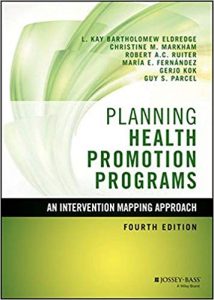
- themes and components
- theory- and evidence-based methods for change
- practical application
- Programme production
- Implementation plan
- Evaluation plan
It should be noted that this framework relates mainly to collaborative healthcare projects, involving multidisciplinary team-working with individuals that may include: behavioural scientists, physiologists, Allied health professionals, care home staff and council officials.
As a ‘cog in a wheel’ (i.e. physiologist working within healthcare teams), personally Intervention Mapping has influenced my methodological perspective and will inform my long-term research, but will have little impact in the short-term for laboratory-based studies. For the behavioural scientist or applied psychologist interested in health promotion, the course would be a great benefit. For everyone else considering healthcare projects incorporating behaviour change I wholeheartedly recommend. Plus, Maastricht is a cultural and gastronomical delight.
If you would like further information on the course and framework, let me know.
Dr James Gavin
Department of Sport and Physical Activity
Bournemouth University
Email: jgavin@bournemouth.ac.uk
New publication by CMMPH Visiting Faculty Dr. Luyben
 Congratulations to Dr. Ans Luyben on her latest co-authored midwifery publication: ‘Conscientious objection to participation in abortion by midwives and nurses: a systematic review of reasons’ in the Open Access journal BMC Medical Ethics. The UK co-authors are linked with Liverpool John Moores University and the University of Liverpool, whilst the third co-author is from Germany. Ans works in Swtzerland and she is Visiting Faculty in the Centre for Midwifery, Maternal & Perinatal Health (CMMPH).
Congratulations to Dr. Ans Luyben on her latest co-authored midwifery publication: ‘Conscientious objection to participation in abortion by midwives and nurses: a systematic review of reasons’ in the Open Access journal BMC Medical Ethics. The UK co-authors are linked with Liverpool John Moores University and the University of Liverpool, whilst the third co-author is from Germany. Ans works in Swtzerland and she is Visiting Faculty in the Centre for Midwifery, Maternal & Perinatal Health (CMMPH).
Congratulations!
Prof. Edwin van Teijlingen
CMMPH
New BU mental health publication
 Congratulations to Faloshade Alloh (PhD student in Faculty of Health and Social Science), Dr. Pramod Regmi (Lecturer in International Health), Abe (Igoche) Onche (BU graduate MSc in Public Health) and Dr. Stephen Trenoweth (Principal Academic and Leaded for BU iWell Research Centre) on the timely publication of their paper on mental health in developing countries [1].
Congratulations to Faloshade Alloh (PhD student in Faculty of Health and Social Science), Dr. Pramod Regmi (Lecturer in International Health), Abe (Igoche) Onche (BU graduate MSc in Public Health) and Dr. Stephen Trenoweth (Principal Academic and Leaded for BU iWell Research Centre) on the timely publication of their paper on mental health in developing countries [1].
Despite being globally recognised as an important public health issue, mental health is still less prioritised as a disease burden in many Low-and Middle-Income Countries (LMICs). More than 70% of the global mental health burden occurs in poorer countries. The paper addresses mental health issues in LMICs under themes such as abuse and mental illness, cultural influence on mental health, need for dignity in care, meeting financial and workforce gaps and the need for national health policy for the mental health sector. This exciting paper has 51 references including several linking to BU publications on research in Africa [2-3] and several papers related to South Asia [4-6], particularly highlighting the recently completed THET project that was led by BU [4-5].
The authors highlight that although mental health education and health care services in most LMICs are poorly resourced; there is an urgent need to address issues beyond funding that contribute to poor mental health. In order to meet the increasing challenge of mental health illness in LMICs, there is a need for effort to address cultural and professional challenges that contribute to poor mental health among individuals. The authors suggest that mental health should be integrated into primary health care in LMICs. Creating awareness on the impact of some cultural attitudes/practices will encourage better uptake of mental health services and increase the ease when discussing mental health issues in these countries which can contribute to reducing the poor mental health in LMICs.
Well done!
Prof. Edwin van Teijlingen
Centre for Midwifery, Maternal and Perinatal Health (CMMPH)
Click here to view the full publication.
References:
- Alloh, F.T., Regmi, P., Onche, I., van Teijlingen E., Trenoweth, S. (2018) Mental health in low- and middle income countries (LMICs): Going beyond the need for funding, Health Prospect 17 (1): 12-17.
- Alloh F, Regmi P, Hemingway A, Turner-Wilson A. (2018) Increasing suicide rates in Nigeria. African Health Journal [In Press].
- Alloh FT, Regmi PR. (2017) Effect of economic and security challenges on the Nigerian health sector. African Health Sciences. 17 (2):591-2.
- Acharya DR, Bell JS, Simkhada P, van Teijlingen ER, Regmi PR. (2010) Women’s autonomy in household decision-making: a demographic study in Nepal. Reproductive Health. 7 (1):15.
- Simkhada B, Sharma G, Pradhan S, Van Teijlingen E, Ireland J, Simkhada P, et al. (2016) Needs assessment of mental health training for Auxiliary Nurse Midwives: a cross-sectional survey. Journal of Manmohan Memorial Institute of Health Sciences. 2:20-6.
- Mahato, P., van Teijlingen, E., Simkhada, P., Angell, C., Ireland, J. on behalf of THET team (2018) Qualitative evaluation of mental health training of Auxiliary Nurse Midwives in rural Nepal. Nurse Education Today 66: 44-50. https://authors.elsevier.com/c/1Wu2axHa5G~S-
- Regmi PR, Alloh F, Pant PR, Simkhada P, van Teijlingen E. (2017) Mental health in BME groups with diabetes: an overlooked issue? The Lancet. 389 (10072):904-5.
Demystifying Research – BUCRU Festival of Learning Event
Demystifying Research – helping us make a difference

Bournemouth University Clinical Research Unit are running an interactive session to help de-mystify the idea of clinical research and illustrate how the public can get involved. It’s not all lab coats and scary machinery!
Come and join us on Monday 18th June 16.00-17.30 as part of BU’s Festival of Learning event and find out a bit more about the research process in a fun & friendly way. Book here
BU Clinical Research Unit (BUCRU) are based on the 5th floor of Royal London House. Feel free to pop in and see us, call us on 61939 or send us an email.
LAST CHANCE to book for NIHR Grant Applications Seminar & Support Event – 26 June 2018
Last chance to book for this with the deadline just over a week away…
Are you planning to submit a grant application to NIHR?
We are holding a one-day event in Bournemouth that is aimed at helping you to improve your chances of success.
The morning seminar session is open to anyone to come and hear Simon Goodwin, RfPB Programme Manager for the South West, and RDS advisers give presentations on what makes a good grant proposal. Topics covered will include:
- what does the NIHR (and in particular RfPB) look for?
- the application as a marketing document: selling the topic, selling the method, and selling the team
- the team
- clarity of description and explanation
- feasibility issues
- identifying and avoiding potential pitfalls.
The afternoon support session of one-to-one appointments is for those who would like to discuss their own proposal with an RDS adviser.
This event is FREE and refreshments and lunch will be provided. Places are limited and will be allocated on a ‘first come, first served’ basis. In order to secure your place please register using our online form by 1pm, 18 June 2018. Find out more.
And don’t forget, your local branch of the NIHR Research Design Service is based within the BU Clinical Research Unit (BUCRU) on the 5th floor of Royal London House. Feel free to pop in and see us, call us on 61939 or send us an email.
New contract awarded to the RDS

We are pleased to announce that the National Institute for Health Research (NIHR) has awarded us a further five years of funding to continue our work as the RDS South West.
Proposals were invited from NHS organisations and Higher Education Institutions in England with proven expertise in research methodology and design. Ten organisations were successful and the combined Research Design Services will form a national network, liaising with each other to develop a consistent service to the research community across England.
The NIHR funding will allow RDS advisers in the South West to continue offering free and confidential advice, drawing on a unique breadth of experience and established track record in improving funding applications.
We have been funded for the ten years prior to this round of funding and the advice offered by us to researchers represents a key contribution to the NIHR’s commitment to delivery of high quality health and social care research.
Professor Gordon Taylor, Director of NIHR RDS SW, said: “I am delighted that the RDS has received a further five years of funding. We look forward to continuing to support researchers, working in applied health, across the South West of England and to strengthen our engagement with partners in social care.”
Find out more about how we could help you by visiting our website or contacting the RDS South West Bournemouth Office hosted within BUCRU (Bournemouth University Clinical Research Unit):
Bournemouth University
Room R505, Royal London House
Christchurch Road
Bournemouth
Dorset, BH1 3LT
Tel: 01202 961939
Email: wardl@bournemouth.ac.uk
BU contribution to Routledge Handbook of Well-Being
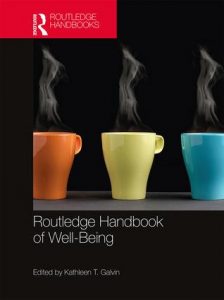 Congratulations to current and past academics in the Faculty of Health & Social Sciences and the Faculty of Science & Technology who contributed to the newly published Routledge Handbook of Well-Being. The editor Prof. Kate Galvin was previously based at Bournemouth University. She is currently Professor of Nursing Practice in the School of Health Sciences at the University of Brighton.
Congratulations to current and past academics in the Faculty of Health & Social Sciences and the Faculty of Science & Technology who contributed to the newly published Routledge Handbook of Well-Being. The editor Prof. Kate Galvin was previously based at Bournemouth University. She is currently Professor of Nursing Practice in the School of Health Sciences at the University of Brighton.
The following four chapters in the edited collection have been authored or co-authored by BU scholars and students past and present:
- Dwelling- Mobility: An Existential Theory of Well-being Chapter 8 by Les Todres & Kate Galvin
- Heritage and Well-being: Therapeutic places, past and present Chapter 11 by Timothy Darvill, Vanessa Heaslip & Kerry Barras
- Embodied Routes to Well-being: Horses and Young People Chapter 20 by Ann Hemingway
- Eighteen Kinds of well-being but there may be many more: A conceptual Framework that provides direction for Caring Chapter 30 by Kate Galvin & Les Todres.
Congratulations to all!
Prof. Edwin van Teijlingen
Psychology event at Bournemouth University on 8th June: reducing sexual assault
Researchers in the Department of Psychology have been conducting several projects on ways to reduce sexual assault and evaluating campaigns to reduce sexual violence. We are running an event we on the 8th June 2018 here in Bournemouth University to showcase the work and engage in roundtable discussions about how we can improve campaigns, change policy and practice in the criminal justice system, and provide supports in University. These discussions involve charities, police, and student support services.
Register at https://reducingsexualassault.eventbrite.co.uk if you are interested in attending.
New GCRF-funded study in South Asia
 A new multidisciplinary project in South Asia, run between two of Bournemouth University’s Faculties, has recently been funded. The cross-faculty project “Scoping Study to understand the maternal health, ageing and wellness in rural India to develop a grass-root centre addressing these issues” has Dr Shanti Shanker (Psychology) as its principal investigator in collaboration with Prof Edwin van Teijlingen (Human Sciences & Public Health). These BU lead researchers have been working in India and Nepal for more than a decade.
A new multidisciplinary project in South Asia, run between two of Bournemouth University’s Faculties, has recently been funded. The cross-faculty project “Scoping Study to understand the maternal health, ageing and wellness in rural India to develop a grass-root centre addressing these issues” has Dr Shanti Shanker (Psychology) as its principal investigator in collaboration with Prof Edwin van Teijlingen (Human Sciences & Public Health). These BU lead researchers have been working in India and Nepal for more than a decade.

This project was recently awarded £76k from the HEFCE GCRF (Higher Education Funding Council for England, Global Challenge Research Funds) Call, at Bournemouth University. The project will be running from 2017 to 2021 between Maharashtra, India, Nepal and the UK. This important research initiative aligns closely with Bournemouth University’s strategic plan around South Asia through Connect India. Connect India is BU’s hub of practice which focuses on the world’s most populated areas and a global region which is developing rapidly in many ways.
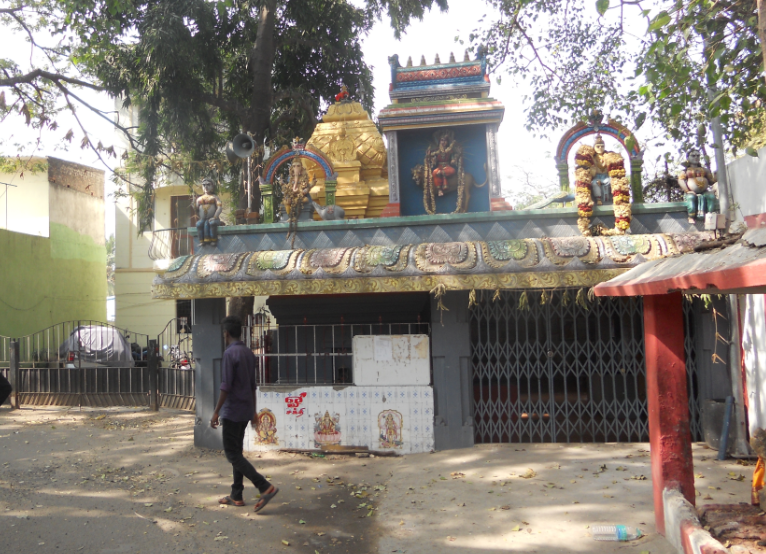
New BU mental health paper published
 Congratulations to FHSS students Folashade Alloh and Igoche Onche who found out today that their ‘Mental health in low-and-middle-income countries (LMIC): Going beyond the need for funding’ has been accepted for publication by the editors of Health Prospect. The paper is co-authored by FHSS staff Dr Pramod Regmi, Prof Edwin van Teijlingen and Dr Steven Trenoweth. Health Prospect is an Open Access journal.
Congratulations to FHSS students Folashade Alloh and Igoche Onche who found out today that their ‘Mental health in low-and-middle-income countries (LMIC): Going beyond the need for funding’ has been accepted for publication by the editors of Health Prospect. The paper is co-authored by FHSS staff Dr Pramod Regmi, Prof Edwin van Teijlingen and Dr Steven Trenoweth. Health Prospect is an Open Access journal.
More than 70% of the global mental health burden occurs in many low-and middle-income countries (LMIC). The paper discusses mental health issues in LMIC under different themes such as abuse and mental illness, cultural influence on mental health, need for dignity in care, meeting financial and workforce gaps and the need for national health policy for mental health sector. The paper highlights that mental health education and health care services in most LMIC is poorly resourced; however, there is an urgent need to address issues beyond funding that contribute to poor mental health. In order to meet the increasing challenge of mental health illness in LMIC, there is a need for effort to address cultural and professional practices that contribute to poor mental health among individuals. The authors argue that mental health should be integrated into primary health care in LMIC. Creating awareness on impact of some cultural attitudes/practices will encourage better uptake of mental health services and increase the ease of discussing mental health issues in these countries which will contribute to reducing stigma faced by mental health patients.
Grant Development & Writing Retreat 10 – 12 September 2018

Do you have a great idea for research in health, social care or public health?
Would you or your team benefit from protected time and expert support to develop your idea into a competitive funding application?
Research Design Service South West (RDS SW) are offering a unique opportunity for health, social care and public health professionals across England to attend a three-day residential Grant Development & Writing Retreat – 10-12 September 2018, School of Psychology, University of Kent, Canterbury.
Applications are invited from individuals or teams of two or three people, at least one of whom must be a health, social care or public health professional working in England. Successful applicants will be offered a free place at the retreat which will include food and accommodation*.The purpose of the Retreat is to give busy professionals dedicated time to rapidly progress their research proposal.
If you think your research team would benefit from protected time and expert support, you can apply to attend the Retreat by submitting a standard form which is available from your local RDS office, hosted by BU Clinical Research Unit (BUCRU) on the 5th floor of Royal London House. Feel free to pop in and see us, call us on 61939 or send us an email.
If in doubt, please contact the coordinating centre at rds.sw@nihr.ac.uk
Delegates are encouraged to work on their projects with local RDS staff before applying to attend the Retreat. The views of the RDS will play an important part in deciding which teams will be invited to attend. It is crucial, therefore, that teams work closely with their local RDS advisers when preparing their applications. It is advisable for teams considering attending the Retreat to contact their local RDS office as early as possible.
The deadline for submission of this form is 12noon, Wednesday 6 June 2018.
* excludes travel to/from Canterbury.
|
Find out more about the Retreat. |












 BU attendance at third annual GCPHR meeting in June
BU attendance at third annual GCPHR meeting in June Interactive Tangible and Intangible Heritage Applications – BU student work featured in new book chapter
Interactive Tangible and Intangible Heritage Applications – BU student work featured in new book chapter Second NIHR MIHERC meeting in Bournemouth this week
Second NIHR MIHERC meeting in Bournemouth this week MSCA Postdoctoral Fellowships 2025 Call
MSCA Postdoctoral Fellowships 2025 Call ERC Advanced Grant 2025 Webinar
ERC Advanced Grant 2025 Webinar Horizon Europe Work Programme 2025 Published
Horizon Europe Work Programme 2025 Published Horizon Europe 2025 Work Programme pre-Published
Horizon Europe 2025 Work Programme pre-Published Update on UKRO services
Update on UKRO services European research project exploring use of ‘virtual twins’ to better manage metabolic associated fatty liver disease
European research project exploring use of ‘virtual twins’ to better manage metabolic associated fatty liver disease